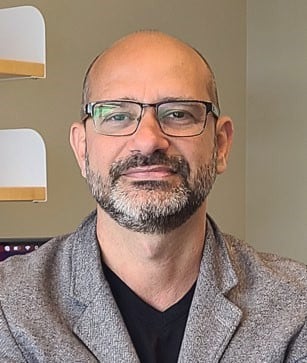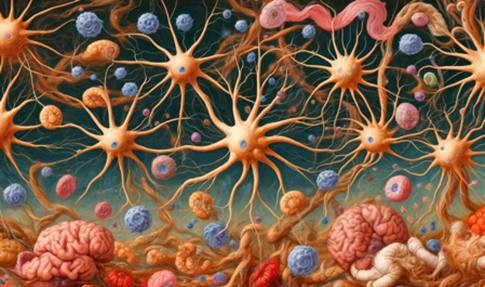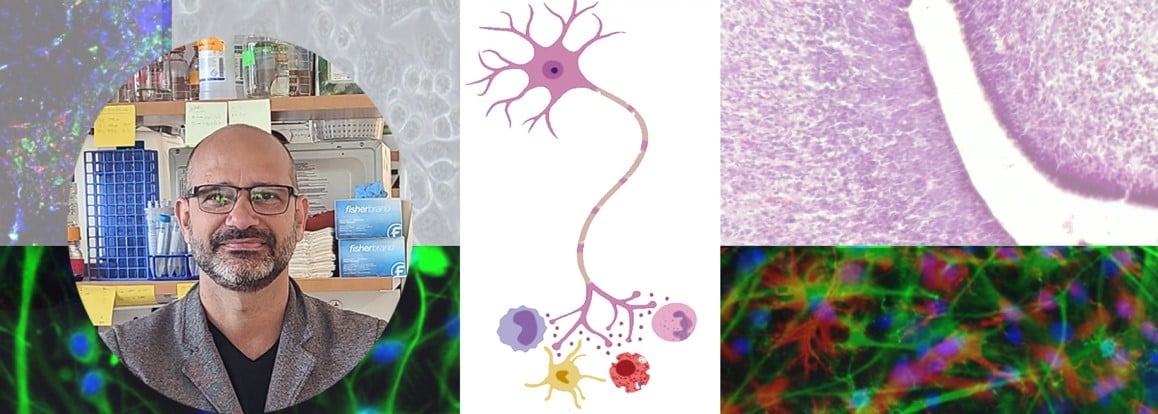Jean Pierre Schatzmann Peron, PhD
What are the components involved in brain inflammation?
 To explore the interactions between brain and immune cells during neuroinflammation, Jean Pierre Schatzmann Peron, PhD, an associate professor of neurology, established the Neuroimmune Interactions Laboratory in 2013 at the University of Sao Paulo - BR. In 2023, Dr. Peron relocated his research team to the Department of Neurology at UMass Chan Medical School to further investigate the mechanisms of neuroinflammation associated with viral infections and autoimmune disorders.
To explore the interactions between brain and immune cells during neuroinflammation, Jean Pierre Schatzmann Peron, PhD, an associate professor of neurology, established the Neuroimmune Interactions Laboratory in 2013 at the University of Sao Paulo - BR. In 2023, Dr. Peron relocated his research team to the Department of Neurology at UMass Chan Medical School to further investigate the mechanisms of neuroinflammation associated with viral infections and autoimmune disorders.
Dr. Peron holds a master’s in pharmacy. His PhD in immunology was earned under the supervision of Dr. Luiz Vicente Rizzo at the University of Sao Paulo in studying the immunoregulatory mechanisms of oral tolerance using the experimental autoimmune encephalomyelitis (EAE). During this period, he was a visiting fellow to Dr. Howard L. Weiner’s Laboratory, in the Ann Romney Center for Neurological Diseases, at Harvard Medical School. After graduating in 2008 he started his post-doctoral research on the role of uterus-derived Mesenchymal Stem Cells (uMSCs).
Dr. Peron’s research demonstrated both human and murine cells can suppress neuroinflammation during Experimental Autoimmune Encephalomyelitis (EAE), the model to study Multiple Sclerosis (MS). His work evidenced the potential of uMSCs as a therapeutic tool against neuroinflammation, which he continues to use in his lab to mitigate the harmful effects.
Dr. Peron's second post-doctoral research was completed under the supervision of Dr. Niels Olsen Saraiva Camara, also at USP, investigating the role of the ionotropic glutamate receptor NMDAR in immune cells, which is responsible for the communication in neurons. This topic continues as a research focus in his lab today.
In 2013 he became assistant professor of the Department of Immunology at USP when the Neuroimmune Interactions Laboratory was born. In 2016 his team joined forces with several other researchers to investigate a new threat of ZIKV. Dr. Peron and his team’s efforts resulted in substantial contributions to understanding the pathophysiology of ZIKA virus and SARS-CoV-2 infection in the brain. His work in neuroimmunology has helped clarify the complex interactions between these viruses and brain cells, especially neuronal precursor cells and astrocytes, establishing the causal correlation between ZIKV and fetal brain pathology in 2016. Using a mouse model, they demonstrated that after vertical transmission, ZIKV can cross placental and fetal blood-brain-barrier (BBB) and infect and kill cells that originate neurons in the fetal brain. This was intimately linked to the capacity of the virus to cause microcephaly, resulting in brain damage, defective brain development, and neuronal damage. Recognized worldwide, this model has been useful for researchers to understand ZIKV’s detrimental effects on fetal brain development as well as for the pre-clinical studies of ZIKV vaccines.
The lab’s research has identified a significant role for the Aryl Hydrocarbon Receptor (AHR) in regulating immune responses during ZIKV infections by its response. The AHR is responsible for regulating cell growth and the immune system’s response to viruses. By dampening the immune response, AHR facilitates increased viral replication within the brain, leading to neurological damage. The Lab’s findings offer potential targets for therapeutic intervention to curb the virus’s neurological impact.
Additionally, the lab discovered the role of soluble Growth Arrest Specific gene 6 (GAS6), a biological immune response, in aiding the vertical transmission of viral particles in mice. The research indicated that adults exhibiting neurological symptoms post-infection show higher levels of GAS6 by infected monocytes, suggesting a biomarker for viral-induced neurological effects.
Further in 2019, with the COVID-19 pandemic, Dr. Peron’s team once then embraced the challenge to investigate the impact of SARS-CoV-2 on brain cells. By infecting Syrian Hamsters cells in vitro and animals in vivo they demonstrated that the virus greatly impacted the expression of proteins in astrocytes, especially those related to the metabolism of the cells. More important, they evidenced the presence of SARS-CoV-2 in the brain of the animals, and the changes were similar to those observed in human samples.
In 2023, Dr. Peron brought the Neuroimmune Interactions Laboratory to the Department of Neurology at UMASS Chan as associate professor, where he continues his journey to better understand the mechanisms of neuroinflammation, including those caused by ZIKV and SARS-CoV-2 and multiple sclerosis (MS).
Their research continues to study long-term results of viral infections and autoimmune diseases by evaluating the brain and the changes in the astrocytes over time to determine if the solutions continue to work if there are additional issues to arise, and what the medium long-term impacts are on brain cells and brain function.
Dr. Peron has mentored six master’s degree students, six PhD candidates, and two postdoctoral researchers, contributing to the scientific community’s future by nurturing emerging talents. His scholarly output includes over 70 peer-reviewed articles with more than 4000 citations, underlining the impact of his research in neuroimmunology.
As a mentor, Dr. Peron shared he enjoys “…interacting with students in a sense to stimulate critical and active thinking. It is important for them to understand and actively engage with their projects”.
 Astrocytes and neurons interacting in renascence style (Figure made with DALL-E)
Astrocytes and neurons interacting in renascence style (Figure made with DALL-E)
He also enjoys using DALLE and open AI image creation tools to improve his seminars and classes by mixing scientific images with famous art styles.
Dr. Peron’s research endeavors are driven by a profound commitment to scientific discovery and a rigorous approach to exploring how viral infections interact with neurological systems. His dedication not only advances our understanding but also sets a high standard for scientific inquiry in his field. Through his continued efforts, Dr. Peron’s work significantly enhances our understanding of viral mechanisms in the brain, paving the way for future therapeutic strategies against viral-induced neurological diseases.
Dr. Peron works closely with UMass Chan researchers within Schaefer Lab, Bosco Lab, Hemond Lab, and Ionete Lab to study innate immunity, to learn how microglia shape the brain during virus infection, adaptive immunity, and immunology and microbiology.
